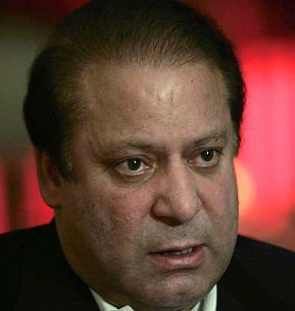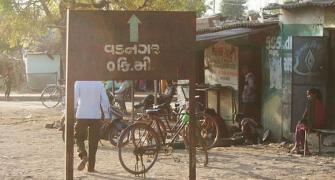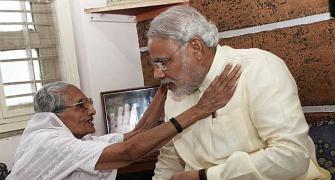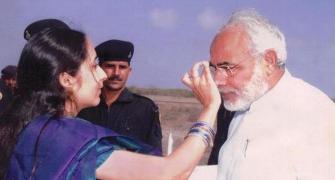 'It seems that the BJP in its desire to catapult Modi onto the international stage, knowing the image deficit due to visa denials, has caused unhappiness in Tamil Nadu, uncertainty in Bangladesh and a churning in Pakistan that Sharif may or may not be able to control,' says Ambassador K C Singh.
'It seems that the BJP in its desire to catapult Modi onto the international stage, knowing the image deficit due to visa denials, has caused unhappiness in Tamil Nadu, uncertainty in Bangladesh and a churning in Pakistan that Sharif may or may not be able to control,' says Ambassador K C Singh.
Narendra Modi's comprehensive electoral win has left the Congress immobilised, Nitish Kumar jobless and erstwhile rivals looking for means to engage with the man set to rule India for the next five years.
The shock for old-timers in the Bharatiya Janata Party is equally severe. After initial whispering that the swearing-in of the new government may be as early as May 21, the delay till May 26, partly due to the change of guard in Gujarat, became explicable when Prime Minister-designate Modi surprised the nation and the South Asian Association for Regional Cooperation neighbours by inviting the heads of government of seven members, for his swearing-in.
Television channels have devoted endless hours debating what some called a foreign policy coup, its merits and implications. Essentially, four members -- Afghanistan, Bangladesh, Bhutan and the Maldives -- were expected to and quickly gave their thumbs up to the invite. The other three are a case apart.
Bangladesh, which Modi had taken pot-shots at for their citizens oozing into India, has its current leader fighting a no-holds-barred struggle with Islamists of different shades. She is India's best friend and a bulwark against the militants in Pakistan gaining greater toe hold in Bangladesh.
The invite would have put her in a quandary as its acceptance would have drawn her criticism from her political opponents. Fortunately for her, she was already en route to Japan, after attending a summit in China. An unfolding State visit perhaps provided her a needed alibi.
Sri Lanka pounced at the invite as it saw this as Modi moving the approach to the country away from the narrow perspective assumed by Tamil politicians.
The reaction, as I anticipated in a television debate hours after the news of invites, in Tamil Nadu was immediate. Vaiko, a recent ally of the Bharatiya Janata Party, strongly condemned it and Chief Minister J Jayalalithaa dubbed it as 'sprinkling salt' on Tamil wounds. She is unlikely to attend the swearing-in.
The focus, despite wrapping it in a SAARC gift bag, immediately shifted to Pakistan. Would Prime Minister Nawaz Sharif accept the invite or not? Two days of cogitation in Islamabad had still not produced a response when news came of a fidayeen attack on the Indian consulate at Herat in Afghanistan.
While most commentators applaud Modi for going in one move from campaign rhetoric to Nobel Prize-level statesmanship, some like me advocate caution in forcing Pakistan's hand. The reasons are multi-fold.
Firstly, history. Since Atal Bihari Vajpayee's bus journey to Lahore -- another out of the box move -- has taught that forcing the pace of normalisation with Pakistan triggers counter measures by the jihadi-army conglomerate. To take two principal examples: Kargil in 1999 and 26/11 in 2008.
Secondly, Sharif may have a parliamentary majority, but he is hemmed in by the rising influence of the jihadi outfits in colouring the political landscape of Pakistan. It was not a coincidence that in the 2013 election the jihadi groups targeted all parties other than the ruling Pakistan Muslim League-Nawaz and Imran Khan's Pakistan Tehreek-e-Insaf. Thus, a huge IOU hangs around Sharif's neck.
Thirdly, by springing a surprise on Nawaz Sharif, very little time was given to him to neutralise the expected disapproval of the jihadi-army combine.
Fourthly, the BJP government still not having taken charge, it could not institute counter-measures for deterring the jihadi-army grouping.
It seems that the BJP in its desire to catapult Modi onto the international stage, knowing the image deficit due to visa denials, has caused unhappiness in Tamil Nadu, uncertainty in Bangladesh and a churning in Pakistan that Sharif may or may not be able to control.
A chaste and spartan ceremony would have avoided these pitfalls and sent a signal to the nation that Modi the administrator was here and that Modi the electioneer was gone till needed again.
Ambassador K C Singh is a former diplomat and strategic affairs expert.










